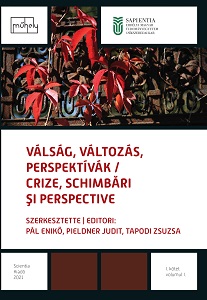EVOLÚCIÓ VAGY DEVOLÚCIÓ – ETIKAI FELELŐSSÉG ÉS TRANSZHUMANIZMUS A BIOLÓGIAI SCIENCE FICTIONBEN
EVOLUTION OR DEVOLUTION – ETHICAL RESPONSIBILITY AND TRANSHUMANISM IN BIOLOGICAL SCIENCE FICTION
Author(s): Orsolya Babos
Subject(s): Philology
Published by: Scientia Kiadó
Keywords: science fiction; biology; dystopia; ethics; transhumanism;
Summary/Abstract: In science-fiction (SF) literature, the numerous biological themed works now represent a subgenre. The main structuring motive of the story in these works – or “novum”, using the phrase adapted by Darko Suvin SF theoretician – is biological in nature – such a natural or artificial, partially or completely fictional element (virus, gene manipulation, divergent evolution, etc.) that has a fundamental effect on the biology, development, degeneration, mutation, or hybridization of the human race or other races. In this study expounding a chapter of my thesis, I compare two SF novels, the Blood Music by Greg Bear and Brain Plague by Joan Sloczewski. The text is interdisciplinary in its nature and mostly discusses narratological and philosophical connections. The works of the genre covered here also raise the question of ethical responsibility. Through my study, I have arrived at the conclusion that while Bear was a writer “by trade” and not a scientist or researcher, he wrote his above-mentioned work with scientific precision, adapting many contemporary relevant theories during the creative process – like the Grey Goo hypothesis, the collective unconscious of Jung, the anthropic principle, or determinism – and organically integrating elements of these into the narrative. Primarily, he studies existential philosophical questions and also tries to present and compare how the individual and collective consciousness, the complex nervous system-like existence function. The narrative also brings up posthuman or post-anthropocentric viewpoints. In this way, the novel matches the requirements of hard SF. While being a biologist, Joan Slonczewski deviated far more from reality. In her space opera, she depicts anthropomorphic microbes living in the brains of people, building the mirror image of human society. Despite their miniature nature, they have a far greater complexity than what could be realistically possible. They create belief systems, can communicate in articulate languages, invent new things, etc. Thereby, the story is a classic social SF, a parable studying social philosophical questions grounded on a novum – such as the existence of microbes with the complexity of the homo sapiens – hard to explain even by pseudo-scientific or fictional arguments.
Book: Válság, változás, perspektívák / Crize, Schimbări şi Perspective
- Page Range: 167-181
- Page Count: 15
- Publication Year: 2021
- Language: Hungarian
- Content File-PDF

